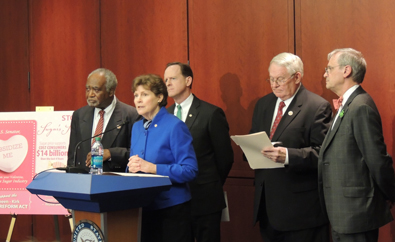WASHINGTON, Feb. 14, 2013- Sen. Jeanne Shaheen, D-N.H., led a group of senators and congressmen today to introduce the Sugar Reform Act, which would draw back price supports for U.S. sugar growers. Supporters of the sugar policy reform said they have a better shot of getting their legislation passed in the 113th Congress than in previous years.
Shaheen said the bill makes several changes to the sugar program provisions added in the 2008 Farm Bill, including reforming the flexible marketing allotments for sugar and repealing the Feedstock Flexibility Program. Senators Pat Toomey, R-Penn., and Mark Kirk, R-Ill., joined her in the effort to pass sugar reform in the Senate, which is a renewal of the failed amendment that attempted to make similar changes to the Senate’s 2012 Farm Bill passed last summer.
The Shaheen-Kirk Sugar Reform Act introduced today also has a version in the House supported by Representatives Joe Pitts, R-Penn., Earl Blumenauer, D-Ore., and Danny Davis, D-Ill., and Bob Goodlatte, R-Va.
“No program should be immune to updates or improvements, not while we’re losing valuable manufacturing jobs all over the country as businesses close or move abroad in search of lower sugar prices,” Shaheen said today.
Under current sugar policy, which is part of the 2008 Farm Bill extension, the sugar program uses price supports, domestic marketing allotments and tariff-rate quotas (TRQs) to influence the amount of sugar available to the U.S. market. However, Mexican imports of sugar are unlimited under North American Free Trade Agreement.
Producer group American Sugar Alliance supports the current system, which it says keeps sugar prices stable by avoiding oversupplies and shortages. Because current sugar surpluses are driving down prices, the group argues that U.S. sugar producers need Congress to maintain “no-cost sugar policy if they are going to have a chance to survive.”
However, the Coalition for Sugar Reform and the Congress members at today’s press conference argue consumers and taxpayers are paying for the program in “hidden costs” by allowing a fixed price for sugar and mandating that in times of surplus, the government buys sugar to sell to ethanol producers.
Senator Toomey maintained that even if sugar prices plunge for growers in the event of a surplus, it could inspire support for sugar reform. “This year taxpayers could realize that they’re being made to subsidize very wealthy sugar growers,” he said. “If the price does go through this completely artificial, government-created level, I actually think you could see more support for making changes.”
While the reform policy received 46 votes in the Senate last year, four votes short of passing, the House is notably a tougher sell. Producer supporters argue that removing price supports and import quotas would expose the U.S. economy to a volatile world dump market for sugar and “flood the U.S. sugar market with subsidized imports.”
A similar amendment introduced by Goodlatte during the House Agriculture Committee’s passage of their 2012 Farm Bill last year failed 10-36. However, Rep. Pitts said today, “I think we’ll be building bipartisan support in the House” to make changes to the sugar program, particularly within an opportunity to reauthorize a five-year farm bill.

#30
For more news, go to www.agri-pulse.com
